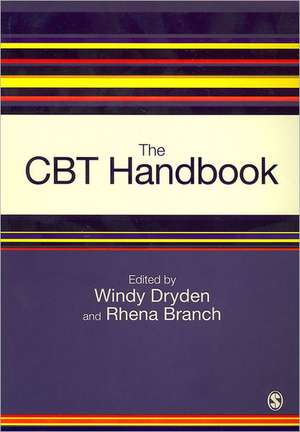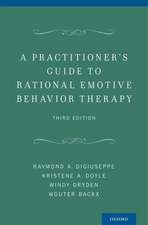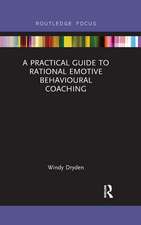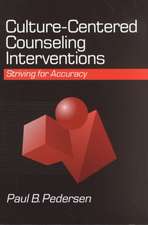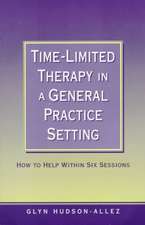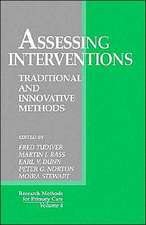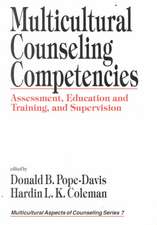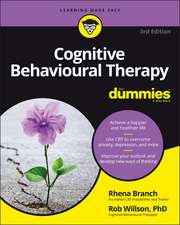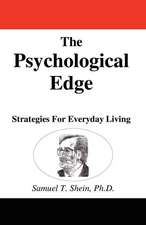The CBT Handbook
Editat de Windy Dryden, Rhena Branchen Limba Engleză Paperback – 14 noi 2011
- CBT Theory
- CBT Skills
- Assessment and Case Formulation in CBT
- The Therapeutic Relationship in CBT
- Values and Ethics in CBT
- Reflective and Self-Evaluative Practice in CBT
- Supervision of CBT Therapists
- Multi-disciplinary working in CBT Practice
This engaging book will prove an indispensible resource for CBT trainees and practitioners.
Preț: 402.00 lei
Preț vechi: 423.16 lei
-5% Nou
Puncte Express: 603
Preț estimativ în valută:
76.92€ • 80.53$ • 63.65£
76.92€ • 80.53$ • 63.65£
Carte disponibilă
Livrare economică 15-29 martie
Livrare express 01-07 martie pentru 48.65 lei
Preluare comenzi: 021 569.72.76
Specificații
ISBN-13: 9781849205528
ISBN-10: 1849205523
Pagini: 512
Ilustrații: illustrations
Dimensiuni: 170 x 242 x 27 mm
Greutate: 0.81 kg
Ediția:New.
Editura: SAGE Publications
Colecția Sage Publications Ltd
Locul publicării:London, United Kingdom
ISBN-10: 1849205523
Pagini: 512
Ilustrații: illustrations
Dimensiuni: 170 x 242 x 27 mm
Greutate: 0.81 kg
Ediția:New.
Editura: SAGE Publications
Colecția Sage Publications Ltd
Locul publicării:London, United Kingdom
Recenzii
'This is an essential resource both for students of cognitive behavioural therapy (CBT) and qualified cognitive behavioural therapists.
The book is organised in five parts that (logically) cover theory, practice. common challenges, specific populations, settings and core professional issues. Student CBT practitioners will find the first three sections invaluable. More seasoned practitioners might dip into parts four and five to explore the use of CBT in different settings and with different client groups, from children to private practice to self-care and reflective practice. For practitioners working in other modalities, the book is a well-referenced and substantial introduction.
The handbook is better than similar publications that attempt to provide this comprehensive resource. It is clearly written and jargon-free; the contributors demonstrate considerable knowledge and experience in their respective specialist fields. It was also very refreshing to find chapters on ethics and supervision, which are often left out of books of this kind.
I really enjoyed the book, gained new knowledge of benefit to my own practice, and would recommend it as a first point of reference for practitioners on CBT theory and its many applications' - Therapy Today
The handbook is better than similar publications that attempt to provide this comprehensive resource. It is clearly written and jargon-free; the contributors demonstrate considerable knowledge and experience in their respective specialist fields. It was also very refreshing to find chapters on ethics and supervision, which are often left out of books of this kind.
I really enjoyed the book, gained new knowledge of benefit to my own practice, and would recommend it as a first point of reference for practitioners on CBT theory and its many applications' - Therapy Today
Cuprins
Editor's Introduction
PART ONE: CBT THEORY
What Is CBT and What Isn't CBT? - Warren Mansell and John L. Taylor
CBT Theory - Peter Trower
CBT: Past, Present and Future - Stirling Moorey
Common Myths and Misconceptions about CBT - Michael Neenan
PART TWO: CBT PRACTICE
The Therapeutic Relationship in CBT - Windy Dryden
Assessment and Formulation in CBT - Frank Wills
CBT Skills - Frank Wills
Working with Comorbidity in CBT - Warren Mansell
Working with 'Diversity' in CBT - Margot Levinson
Levels of Therapist Involvement in CBT - Chris Williams
Multidisciplinary Working in CBT Practice - Gillian Waldron and Rob Willson
Adapting CBT to a Broad Clientele - Windy Dryden
PART THREE: CBT: COMMON CHALLENGES
Challenges in the CBT Client-Therapist Relationship - Rhena Branch
Challenges with Homework in CBT - Rhena Branch
Challenges with Maintenance and Change in CBT - Wendy Wood
PART FOUR: CBT: SPECIFIC POPULATIONS AND SETTINGS
CBT with Children and Adolescents - Trevor Withers
CBT with Older People - Dichelle Wong and Ken Laidlaw
CBT with People with Intellectual and Developmental Disabilities - John L. Taylor and William R. Lindsay
CBT in Health and Social Care Settings - Michael J. Scott
CBT in Criminal Justice Settings - Kevin Gourney
CBT in Private Practice - Gladeana MacMahon
PART FIVE: CBT: PROFESSIONAL ISSUES
Ethical Principles for CBT Practitioners - Tim Bond and Windy Dryden
Therapist Development and Self-care in CBT - Rhena Branch
Supervision of CBT Therapists - Rhena Branch and Windy Dryden
Getting the Most from Your CBT Training - Geoff Baxter
Reflective and Self-Evaluative Practice in CBT - Beverley Haarhoff and Paul Farrand
PART ONE: CBT THEORY
What Is CBT and What Isn't CBT? - Warren Mansell and John L. Taylor
CBT Theory - Peter Trower
CBT: Past, Present and Future - Stirling Moorey
Common Myths and Misconceptions about CBT - Michael Neenan
PART TWO: CBT PRACTICE
The Therapeutic Relationship in CBT - Windy Dryden
Assessment and Formulation in CBT - Frank Wills
CBT Skills - Frank Wills
Working with Comorbidity in CBT - Warren Mansell
Working with 'Diversity' in CBT - Margot Levinson
Levels of Therapist Involvement in CBT - Chris Williams
Multidisciplinary Working in CBT Practice - Gillian Waldron and Rob Willson
Adapting CBT to a Broad Clientele - Windy Dryden
PART THREE: CBT: COMMON CHALLENGES
Challenges in the CBT Client-Therapist Relationship - Rhena Branch
Challenges with Homework in CBT - Rhena Branch
Challenges with Maintenance and Change in CBT - Wendy Wood
PART FOUR: CBT: SPECIFIC POPULATIONS AND SETTINGS
CBT with Children and Adolescents - Trevor Withers
CBT with Older People - Dichelle Wong and Ken Laidlaw
CBT with People with Intellectual and Developmental Disabilities - John L. Taylor and William R. Lindsay
CBT in Health and Social Care Settings - Michael J. Scott
CBT in Criminal Justice Settings - Kevin Gourney
CBT in Private Practice - Gladeana MacMahon
PART FIVE: CBT: PROFESSIONAL ISSUES
Ethical Principles for CBT Practitioners - Tim Bond and Windy Dryden
Therapist Development and Self-care in CBT - Rhena Branch
Supervision of CBT Therapists - Rhena Branch and Windy Dryden
Getting the Most from Your CBT Training - Geoff Baxter
Reflective and Self-Evaluative Practice in CBT - Beverley Haarhoff and Paul Farrand
Descriere
Edited by two of the biggest names in the field, Windy Dryden and Rhena Branch, with 26 chapters by leading experts, this timely book alone as the most accessible yet comprehensive guide to CBT theory, skills, research and practice.
